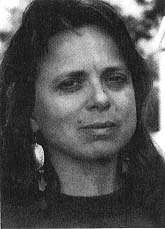 Cherrie Moraga
Cherrie MoragaAuthor
FemmeNoir
A Web Portal For Lesbians Of Color
 Cherrie Moraga
Cherrie MoragaCherrie Moraga was born in Los Angeles in
1952. She is of Chicana/Anglo descent which has influenced her
experiences as a lesbian poet, playwright, essayist, editor,
teacher, and activist.
Moraga describes herself as "La Guera," which means
fair-skinned. She was born with the features of her Chicana
mother and the skin of her Anglo father. The history of her
family has been a large influence on Moraga's writing. Her
respect for her mother comes from the hardships and struggles
that she endured throughout her childhood. At a young age her
mother became the main support of her own family after her
father left. She worked to survive and had little opportunity to
get an education. Without a formal education in English,
Moraga's mother was considered illiterate in this country. Her
fluency in Spanish was not passed on to Moraga or her siblings
in the hope that they may be able to pass more effectively in
"white" society. Because Moraga was fair-skinned, "passing"
became a part of daily life that made it easier for her to
succeed in the United States. Moraga realized the advantages of
having "white privilege" (a term that refers to the privileges
of being white and therefore having more advantages in life).
This had a counter-affect on Moraga's ability to connect fully
with her Chicana background, pulling her further from her mother
and the knowledge of who she really was. Moraga explains, "From
all this, I experience a huge disparity between what I was born
into and what I grew to become."
After her college years Moraga made a realization that led to a
new found connection with her mother. She acknowledged her own
lesbianism after years of hiding it, from not only others, but
herself. The acceptance of her homosexuality became a link to
the heart of her Chicana heritage and opened new doors for an
understanding of herself and her family. "When I finally lifted
the lid to my lesbianism, a profound connection with my mother
reawakened in me. It wasn't until I acknowledged and confronted
my own lesbianism in the flesh, that my heartfelt identification
with and empathy for my mother's oppression--due to being poor,
uneducated, and Chicana--was realized," she said.
Her involvement in writing began early in her life, but her
serious works emerged after her "coming out" as a lesbian. She
began to grow more as a feminist and her writing became more
than a means of expression, it became a way of life. Her
lesbianism became an avenue to her success in writing from her
heart and her mind, together. This was an important turning
point in her relation to writing and where it would lead her.
Moraga began publishing her works in the 1980s. She is one of
the first and few Chicana/Lesbian writers of our times, setting
the stage for younger generations of other minority writers and
activists.
Along with her books Moraga dove into writing plays. The plays
deal with the themes surrounding feminism, ethnicity, sexuality,
and other gender-related issues. Her work in the theatre has
contributed to the growth of the Chicano Theatre. Moraga is
currently a member of a Theatre Communications Group and was the
recipient of the NEA Theatre Playwriting Fellowship Award. Her
most recent play, Watsonville: Some Place Not Here, won the Fund
For New American Plays Award, from the Kennedy Center for the
Performing Arts. The play was performed at the Brava Theatre
Company of San Francisco in May of 1996.
In 1981, she and Gloria Anzaldua co-edited the
anthology This Bridge Called My Back: Writings by Radical
Women of Color. They were unable to find a publisher for
this book. Moraga then co-founded with Barbara Smith, Kitchen
Table/Women of Color Press in New York. This is the only press
in the United States devoted to publishing works by women of
color. This Bridge Called My Back was awarded the
American Book Award from the Columbus Foundation and quickly
found a widespread readership across the county (in women's
studies programs and by women of color). Moraga's 1983 book
Loving in the War Years: Lo que nunca paso por sus labios
became the first published book an openly lesbian Chicana. It
explores the issue of multiple identities -- Chicana, lesbian
and feminist. Other works by Moraga include several plays: La
extranjera (1985), Giving Up the Ghost: Teatro in 2 Acts
(1986), Shadow of a Man (1988), and Heroes and Saints
(1989).
Source: Voices from the Gaps
This Bridge Called My Back: Writings by Radical Women of Color
Home